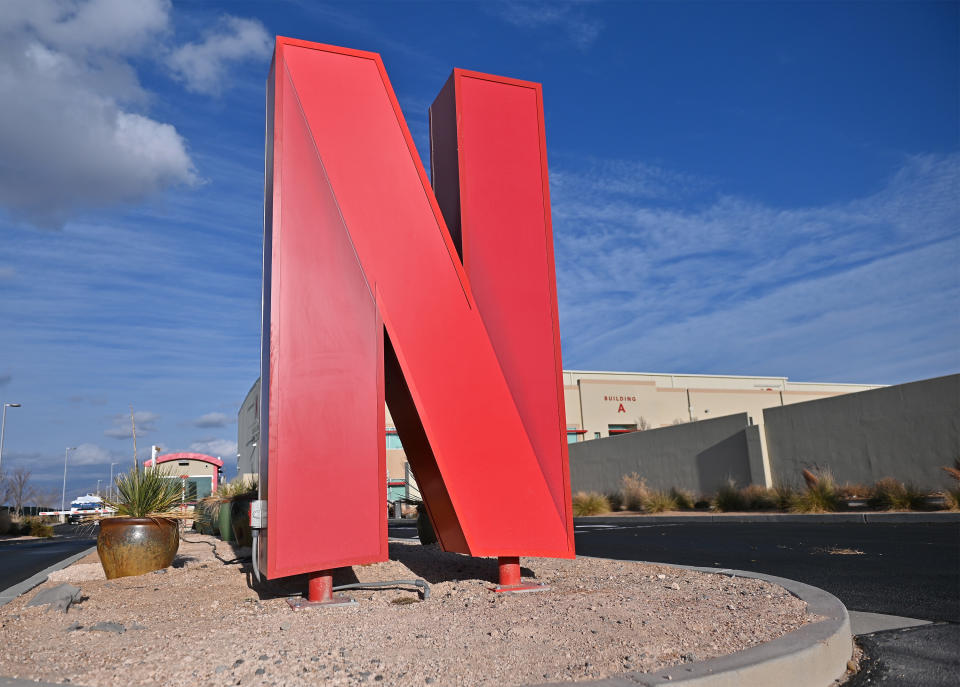Netflix shares down more than 20% after losing 200,000 subscribers in first quarter

Concerning news from Netflix's earnings today. The streaming service reported that in the first quarter of 2022, it lost 200,000 subscribers -- its first subscriber loss in over a decade. And its losses are expected to continue, as Netflix forecasts a global paid subscriber loss of 2 million for the second quarter.
This loss comes in behind the company's previous estimates. The company told its shareholders it expected to add 2.5 million net subscribers during the first quarter, compared with 4 million in the same quarter a year ago. Analysts had been expecting 2.7 million subscribers.
The decline brought Netflix's subscriber base to 221.6 million, down from 221.8 million in the prior quarter. The company estimated its service is being shared with over 100 million additional households, over 30 million of which are based in the U.S and Canada.
The company explained the subscriber loss as being related to a number of factors. Notably, the suspension of its service in Russia led to a loss of 700,000 subscribers. Excluding that, Netflix says it would have instead seen 500,000 net subscriber additions in the quarter. Russia's invasion of Ukraine may have had a further impact on other regions, as Netflix said it saw a slowdown in its business in Central and Eastern Europe in March, which coincided with the invasion's start.
Other factors contributing to the loss cited by Netflix in its shareholder letter were varied. The streamer pointed to everything from password sharing to the competitive landscape to Covid and even to inflation to explain why it was doing so poorly with new user acquisition. To address the password sharing issues, Netflix recently began testing a feature that would prompt subscribers to pay extra if they were sharing the service with people outside their own household.
While this new feature is being tested in Costa Rica, Peru, and Chile, the company suggests this will expand in the future. Netflix wrote in its shareholder letter:
"There’s a broad range of engagement when it comes to sharing households from high to occasional viewing. So while we won’t be able to monetize all of it right now, we believe it’s a large short- to mid-term opportunity."
In January, Netflix said it expected to add a smaller number of subscribers in the first quarter than it had in previous years because most of its highest-profile content was to be released toward the end of the quarter, including the second season of “Bridgerton” and “The Adam Project." But this doesn't fully explain the impact as Netflix ran several other popular shows during the quarter, beyond these higher-profile efforts.
To some extent, Netflix may have acknowledged that its strategy of a lot of formulaic and lightweight, reality programming may not always hit the mark. The company in its shareholder said to help reaccelerate users' viewing and its revenue growth it will work to improve "all aspects of Netflix - in particular, the quality of our programming and recommendations." (That's as close as we may get to hearing Netflix confirm programming quality has gone downhill.)
In terms of the competitive landscape, Netflix has historically competed with linear TV, Amazon, YouTube, and Hulu, but says things have changed over the past three years with new entrants coming to the market. As the company wrote in its shareholder letter, this is particularly impacting the U.S. growth:
"...Traditional entertainment companies realized streaming is the future, many new streaming services have also launched. While our U.S. television viewing share, for example, has been steady to up according to Nielsen, we want to grow that share faster."
The company noted that it also saw slightly lower retention compared with its previous guidance, but claimed it was still healthy and better than its rivals.
Revenue in the quarter reached $7.78 billion below analysts' estimates of $7.93 billion. EPS came in a $3.53 vs $2.89 expected, however.
The company's stock is plunging in after-hours trading on the news of the subscriber declines. Shares declined by 23% in after-market trading, eliminating $30 billion in market value.
Netflix's market share has dropped significantly in the past two years. Between Q1 2020 and Q1 2022, it has declined from 55.7% to 45.2% globally, and from 52.4% and 42.4% in the U.S, according to Parrot Analytics.
More to come...

 Yahoo Finance
Yahoo Finance 